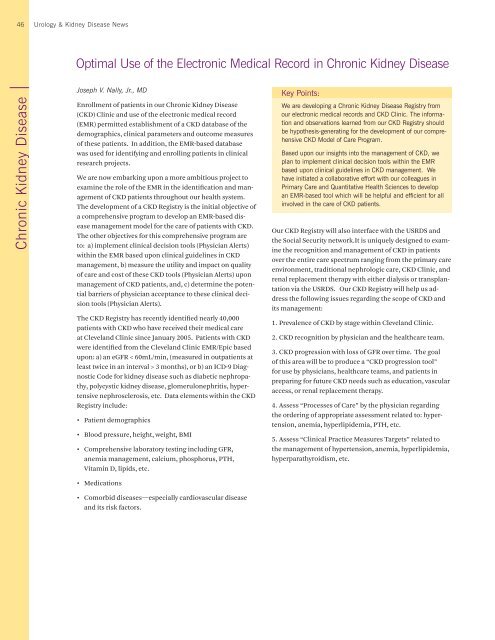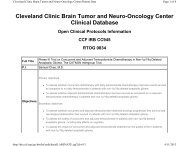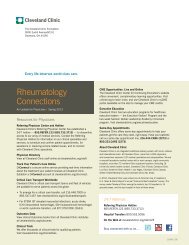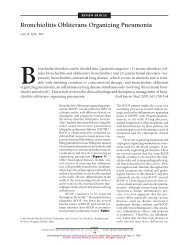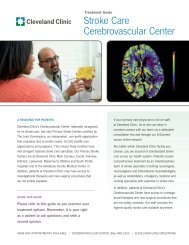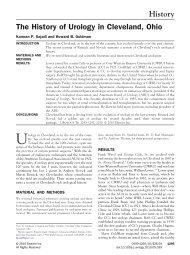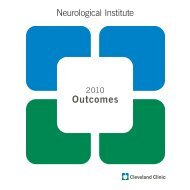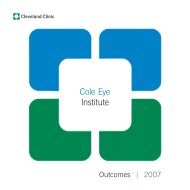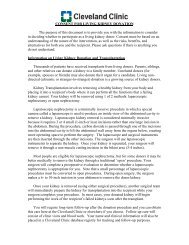Urology & Kidney Disease News Fall 2009 - Cleveland Clinic
Urology & Kidney Disease News Fall 2009 - Cleveland Clinic
Urology & Kidney Disease News Fall 2009 - Cleveland Clinic
Create successful ePaper yourself
Turn your PDF publications into a flip-book with our unique Google optimized e-Paper software.
46 <strong>Urology</strong> & <strong>Kidney</strong> <strong>Disease</strong> <strong>News</strong><br />
Chronic <strong>Kidney</strong> <strong>Disease</strong><br />
Optimal Use of the Electronic Medical Record in Chronic <strong>Kidney</strong> <strong>Disease</strong><br />
Joseph V. Nally, Jr., MD<br />
Enrollment of patients in our Chronic <strong>Kidney</strong> <strong>Disease</strong><br />
(CKD) <strong>Clinic</strong> and use of the electronic medical record<br />
(EMR) permitted establishment of a CKD database of the<br />
demographics, clinical parameters and outcome measures<br />
of these patients. In addition, the EMR-based database<br />
was used for identifying and enrolling patients in clinical<br />
research projects.<br />
We are now embarking upon a more ambitious project to<br />
examine the role of the EMR in the identification and management<br />
of CKD patients throughout our health system.<br />
The development of a CKD Registry is the initial objective of<br />
a comprehensive program to develop an EMR-based disease<br />
management model for the care of patients with CKD.<br />
The other objectives for this comprehensive program are<br />
to: a) implement clinical decision tools (Physician Alerts)<br />
within the EMR based upon clinical guidelines in CKD<br />
management, b) measure the utility and impact on quality<br />
of care and cost of these CKD tools (Physician Alerts) upon<br />
management of CKD patients, and, c) determine the potential<br />
barriers of physician acceptance to these clinical decision<br />
tools (Physician Alerts).<br />
The CKD Registry has recently identified nearly 40,000<br />
patients with CKD who have received their medical care<br />
at <strong>Cleveland</strong> <strong>Clinic</strong> since January 2005. Patients with CKD<br />
were identified from the <strong>Cleveland</strong> <strong>Clinic</strong> EMR/Epic based<br />
upon: a) an eGFR < 60mL/min, (measured in outpatients at<br />
least twice in an interval > 3 months), or b) an ICD-9 Diagnostic<br />
Code for kidney disease such as diabetic nephropathy,<br />
polycystic kidney disease, glomerulonephritis, hypertensive<br />
nephrosclerosis, etc. Data elements within the CKD<br />
Registry include:<br />
<br />
<br />
<br />
anemia management, calcium, phosphorus, PTH,<br />
Vitamin D, lipids, etc.<br />
<br />
<br />
and its risk factors.<br />
Key Points:<br />
We are developing a Chronic <strong>Kidney</strong> <strong>Disease</strong> Registry from<br />
our electronic medical records and CKD <strong>Clinic</strong>. The information<br />
and observations learned from our CKD Registry should<br />
be hypothesis-generating for the development of our comprehensive<br />
CKD Model of Care Program.<br />
Based upon our insights into the management of CKD, we<br />
plan to implement clinical decision tools within the EMR<br />
based upon clinical guidelines in CKD management. We<br />
have initiated a collaborative effort with our colleagues in<br />
Primary Care and Quantitative Health Sciences to develop<br />
<br />
involved in the care of CKD patients.<br />
Our CKD Registry will also interface with the USRDS and<br />
the Social Security network.It is uniquely designed to examine<br />
the recognition and management of CKD in patients<br />
over the entire care spectrum ranging from the primary care<br />
environment, traditional nephrologic care, CKD <strong>Clinic</strong>, and<br />
renal replacement therapy with either dialysis or transplantation<br />
via the USRDS. Our CKD Registry will help us address<br />
the following issues regarding the scope of CKD and<br />
its management:<br />
1. Prevalence of CKD by stage within <strong>Cleveland</strong> <strong>Clinic</strong>.<br />
2. CKD recognition by physician and the healthcare team.<br />
3. CKD progression with loss of GFR over time. The goal<br />
of this area will be to produce a “CKD progression tool”<br />
for use by physicians, healthcare teams, and patients in<br />
preparing for future CKD needs such as education, vascular<br />
access, or renal replacement therapy.<br />
4. Assess “Processes of Care” by the physician regarding<br />
the ordering of appropriate assessment related to: hypertension,<br />
anemia, hyperlipidemia, PTH, etc.<br />
5. Assess “<strong>Clinic</strong>al Practice Measures Targets” related to<br />
the management of hypertension, anemia, hyperlipidemia,<br />
hyperparathyroidism, etc.


